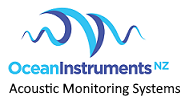Marine compliance is difficult and costly, particularly in marine reserves which are currently reliant on public reporting and manual patrolling. Acoustics provides a mechanism where this can be achieved autonomously 24/7. Different fishing activities have their own unique “soundprint,” much like a fingerprint. We have taken advantage of this and have developed a prototype passive listening device that can relay real time acoustic information to the cloud. The aim of this PhD project is to develop Artificial Intelligence technology that can detect and optimally classify different classes of marine vessel (e.g. recreational boat fishing /not fishing, commercial boat trawling or lone lining). The resulting software and hardware will be open source thereby enabling other researchers, Government Departments (e.g. Department of Conservation – DOC) or Non-Government Organisations (NGO’s e.g. Conservation International) to utilise.
This project is funded by Live Ocean Foundation (https://liveocean.com/project/buoys-that-listen/) and the student will be supervised by Associate Professor’s Craig Radford in the Institute of Marine Science and Yun Sing Koh in the School of Computer Science. The research team has also teamed up with Ocean Instrument Ltd (www.oceaninstruments.co.nz) who are world leaders in underwater listening technology and will provide valuable insight into the implementation of the AI.
The scholarship consists of a stipend of NZ$28,800 per annum tax-free and also covers University of Auckland PhD fees. The duration of the scholarship is three years, with a possible 6 month extension.
Applicants for this project should hold a first class MSc or honours degree, or equivalent. The project will require extensive machine learning techniques, therefore programming skills, in particular, the ability to code machine learning models and have edge computing programming skills are essential. Also, having the ability to develop, validate and test machine learning models. A basic understanding of underwater acoustics will be helpful. The PhD position can either be based on the city campus within the School of Computer Science or based at the Leigh Marine Laboratory (www.marine.auckland.ac.nz).
Applications should include evidence of qualifications (official academic transcript) and research experience, together with a curriculum vitae and contact details of two academic referees. Applications should be supported by a cover letter that states why the candidate is interested in the position and how their qualifications are suited to the proposed research. Please email c.radford@auckland.ac.nz with completed applications as well as any additional inquiries.
Closing date for applications is 31 July 2022, with the expectation of commencement sometime around October 2022
